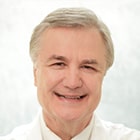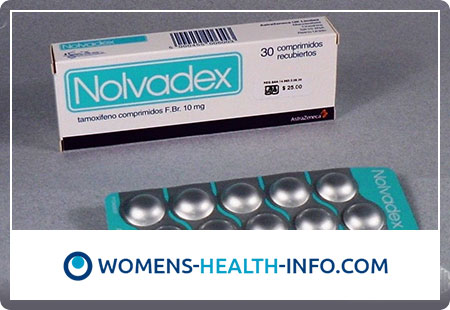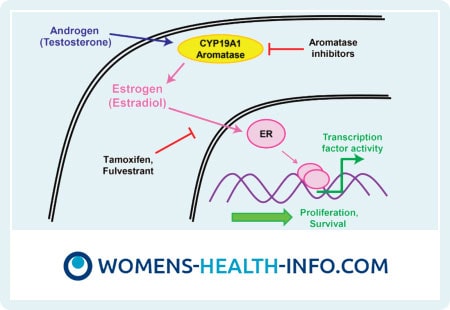
![blockquote]() Estrogen blockers are chemical compounds that block the actions of estrogen. Antiestrogenic drugs are used in the treatment of various diseases. They are widely used to treat breast cancer processes in order to slow down tumor growth or prevent recurrence. As with other drugs that interact with hormones in the body, these drugs should be used under medical supervision.
Estrogen blockers are chemical compounds that block the actions of estrogen. Antiestrogenic drugs are used in the treatment of various diseases. They are widely used to treat breast cancer processes in order to slow down tumor growth or prevent recurrence. As with other drugs that interact with hormones in the body, these drugs should be used under medical supervision.

The benefits and harms of estrogen
Estrogen, or steroid hormone, is synthesized primarily by the ovaries. It affects a number of body processes. Women of childbearing age have the highest levels of this natural hormone. Excessive volume, however, can cause a syndrome known as hyperestrogenism. This disease can lead to oncological processes in the breast and endometrial cancer. Anti-estrogen drugs and estrogen blockers or aromatase inhibitors can fix this. Such drugs, however, have positive and negative effects on women and men.
Types of estrogen blockers, their use
There are a number of different types of estrogen blockers. Aromatase inhibitors actually block the production of estrogen. Selective estrogen receptor modulators such as Tamoxifen, Clomiphene are designed to block estrogen receptors and behave differently for different types of tissue. Antiestrogens also block estrogen receptors.
Antiestrogens prevent testosterone from being converted to estradiol, and estrogenic hormones become inactive or blocked.
In the treatment of cancer, these drugs are used to slow the growth of the tumor. In this case, selective estrogen receptor modulators can target specific estrogen receptors. Blockers, including Clomiphene, are also sometimes used in fertility treatments and may help some women who find it difficult to get pregnant. These drugs are also used by some clinicians to treat children who have delayed puberty until they are old enough.
It is common among bodybuilders to use estrogen blockers because of the estrogenic effect of high testosterone levels in the body. Testosterone is a precursor to estrogen, and aromatase inhibitors can be used to stop excess estrogen from building muscle mass while keeping levels low in the body. This practice has attracted many, especially when anti-estrogen drugs are used primarily for cosmetic purposes. In this case, people use pills and food supplements without medical supervision.
Side effects
There are side effects of anti-estrogen drugs. They can cause dizziness, headaches, sweating, hot flashes, and confusion. Only an endocrinologist can determine the appropriate dosage for the patient, depending on the situation, and the acceptable threshold for side effects. The endocrinologist may also prescribe regular blood hormone samples when assessing the patient's general health to confirm that the use of antiestrogens is safe and functional for the patient.
Treatment of men
As men age, testosterone levels drop. However, if testosterone is rapidly or significantly reduced, then this can lead to the development of hypogonadism. This condition, characterized by the body's inability to produce this important hormone, can cause many symptoms, including:
- loss of libido;
- decreased production and quality of semen;
- erectile dysfunction;
- tiredness.
If we talk about estrogen, then first of all they think that it is a female hormone, but its presence ensures that the male body functions properly. There are three types of estrogens: estriol, estrone, and estradiol. Estradiol is the main active estrogen in men. It plays a vital role in maintaining the function of male joints and brain tissue. Anti-estrogen drugs also allow sperm to develop properly.
Hormonal imbalances - increased estrogen levels and decreased testosterone levels - create problems. Too much estrogen in the male body can lead to:
- gynecomastia (excess development of breast tissue);
- cardiovascular problems;
- increased risk of stroke;
- weight gain;
- problems with the prostate.
There are a number of steps you can take to restore balance in estrogen levels. For example, if your excess estrogen is associated with low testosterone levels, testosterone replacement therapy as an estrogen blocker may be helpful.
Pharmaceutical estrogen blockers
Certain pharmaceutical products can produce estrogen-blocking effects in men. As a rule, they are most often intended for use by women, but are gaining popularity among men, especially those who wish to have children. Testosterone supplementation can lead to infertility. But estrogen blockers like Clomid can restore hormonal balance without compromising fertility.
Several drugs, known as selective estrogen receptor modulators, are commonly marketed as drugs for the treatment of breast cancer. But they can also be used to block estrogen in men. These drugs are used for a variety of conditions associated with low testosterone levels, including:
- infertility;
- low sperm count;
- gynecomastia;
- osteoporosis.
These drugs should be used selectively, depending on the patient's condition. Such antiestrogenic drugs are used. At the pharmacy you can buy:These drugs should be used selectively, depending on the patient's condition. Such antiestrogenic drugs are used. At the pharmacy you can buy:
- "Tamoxifen"
- "Arimidex"
- "Letrozole"
- "Raloxifene"
Effect on bone tissue
According to clinicians, prolonged exposure to estrogen drugs can cause endometrial cancer in women. "Raloxifene" - a selective modulator of estrogen receptors - can prevent the development of cancer, selectively blocks the absorption of estrogen. This drug, however, is also capable of inhibiting the beneficial effects of estrogen on bone density. A new drug, Lazofoxifene, may correct this problem. It prevents bone loss in postmenopausal women and reduces bone fragility. The use of this drug is generally safe, but may increase blood clots.
Drug interactions
The estrogen blocker Tamoxifen may help prevent cancer. Cancer patients are often depressed and drugs in this group can interact negatively with antidepressant medications. Should be used "Paroxetine", due to the fact that women taking "Tamoxifen" and "Paroxetine" are less at risk of death than women taking "Tamoxifen" and any other antidepressant. This is because Paroxetine is selective.
Anti-estrogen drugs and drugs
The descriptions of all these funds indicate that each drug is used individually in a particular case.
"Clomid", or "Clomiphene citrate" was one of the original drugs used in the treatment of gynecomastia, because it raises the level of testosterone production in the body. There are some side effects from prolonged use, such as vision problems. There are more effective substances on the market that work in the same way, but Clomid is still an effective and inexpensive blend for any athlete.
It is not an anabolic steroid, the drug is usually prescribed to women as an aid for infertility, as it has a pronounced ability to stimulate ovulation, which is achieved by blocking / minimizing the effects of estrogen in the body. To be more specific, "Clomid" is a chemical synthetic estrogen with agonist / antagonist properties. In some target tissues, it can block the ability of estrogen to bind to its receptor. Its clinical benefit is to counter the negative feedback of estrogens in the hypothalamic-pituitary-ovarian system, which enhances the release of LH and FSH. All this leads to ovulation.
For sports purposes, "Clomiphene citrate" has no effect in women. In men, however, there is an increase in the production of follicle-stimulating and (primarily) luteinizing hormone, which stimulates the natural production of testosterone. This effect is especially beneficial for the athlete at the end of the steroid cycle when endogenous testosterone levels are depressed. Without testosterone (or other androgens), "cortisol" predominates and affects muscle protein synthesis. But it quickly "eats up" most of the newly acquired muscle after withdrawal. Clomid can play an essential role in preventing this accident for athletic performance. For women, the benefit of clomid is the possible management of endogenous estrogen levels. This will increase the loss of fat and muscle, especially in areas such as the thighs and buttocks. Clomiphene citrate, however, often produces side effects in women, but is nevertheless in demand among this group of athletes.
Tamoxifen blocks estrogen receptors in breast cancer cells. This stops estrogen from interacting with them and inhibits cell growth and division. While Tamoxifen acts as an antiestrogen in breast cells, it acts as estrogen in other tissues: the uterus and bones.
For women with dependent invasive breast cancer, Tamoxifen can be used for 5-10 years after surgery to reduce the likelihood of spreading metastases. It also reduces the risk of developing cancer in the other breast. For the early stage, this drug is used mainly for patients who have not reached menopause. Aromatase inhibitors are the preferred treatment for women with menopause.
Tamoxifen can also stop the growth and even shrink tumors in patients with metastatic cancer. It can also be used to reduce the risk of developing breast cancer.
This drug is taken orally, most often in pill form.
Side effects of antiestrogen drugs include fatigue, hot flashes, vaginal dryness, or heavy discharge and mood swings.
Some women with bone metastases may have pain and swelling in muscles and bones. This usually does not last long, but in some rare cases, women may also develop high blood calcium levels that cannot be controlled. If this happens, the treatment may be suspended for a while.
Rare but more serious side effects are also possible. These drugs may increase the risk of myometrial cancer in menopausal women. Increased blood clotting is another possible serious side effect. Deep vein thrombosis occurs, but sometimes a piece of the clot may come off and eventually block an artery in the lungs (pulmonary embolism).
Rarely "Tamoxifen" has been the cause of strokes and heart attacks in postmenopausal women.
Depending on the woman's menopausal status, Tamoxifen may have different effects on the bones. In premenopausal women, "Tamoxifen" can cause thinning of the bones, but in postmenopausal women, calcium levels increase, which is necessary for bone strength.
The benefits of this medication outweigh the risks for nearly all women with hormone-dependent invasive breast cancer.
A similar drug is Toremifen, which is approved for the treatment of metastatic breast cancer. But this medicine will not work if Tamoxifen was used, but without effect.
Fulvestrant is a drug that first blocks estrogen receptors and then also removes the receptor's ability to bind. It acts as an antiestrogen throughout the body.
Fulvestrant is used to treat advanced metastatic breast cancer and is most often used after other hormonal drugs (Tamoxifen and aromatase inhibitors) have stopped working.
Common side effects can include hot flashes, night sweats, mild nausea, and tiredness. In theory, it can weaken bones (osteoporosis) if taken for a long time.
This drug has gained acceptance for use in postmenopausal women who do not respond to Tamoxifen or Toremifen. It is sometimes used for its intended purpose in premenopausal women, often in combination with a luteinizing hormone-releasing agonist to shut down the ovaries.
Raloxifene is used by women to prevent and treat bone loss or osteoporosis after menopause. It helps keep bones strong, reducing the chances of fractures.
Raloxifene may also prevent the occurrence of invasive breast cancer after menopause. It is not an estrogen hormone, but acts like estrogen in certain parts of the body, such as bones. Elsewhere in the body (uterus and breast), Raloxifene acts as an estrogen blocker. It does not relieve various climacteric syndromes. Raloxifene belongs to a class of drugs known as Selective Estrogen Receptor Modulators-SERMs (estrogenic and antiestrogenic drugs).

Anti-estrogen drugs and sports
Some drugs are widely used by bodybuilders to build muscle mass.
Cyclophenyl is a non-anabolic / androgenic steroid. It works as an antiestrogen and as a testosterone stimulant. Cyclophenyl is a very weak and mild estrogen, but it binds to estrogen receptors and prevents the binding of natural estrogen receptors. In fact, it works so well that some athletes take the drug during steroid treatment in order to keep estrogen levels low. The result is a decrease in the amount of fluid in the body, which is created by steroids, and a decrease in gynecomastia. The athlete has a tougher appearance using drugs that could potentially be taken in preparation for a competition. Bodybuilders, however, use it less often as they prefer the more affordable Nolvadex and Proviron.
Like Clomid, Cyclofenil is ineffective in women, since it has a positive effect only on the production of hormones in men. The increase in testosterone levels caused by this drug is not enough to talk about dramatic improvements, but it will provide an increase in strength, even a small increase in body weight, a noticeable increase in energy and an increase in regeneration are possible. These results are especially noticeable for advanced athletes with little or no experience with steroid use. The results of use become noticeable only after a week.
In some cases, athletes experience acne-type rashes, increased sex drive and hot flashes. These symptoms are especially indicative of evidence that a compound is actually effective. After stopping use, some report depressed mood and slight decrease in physical strength. Those who take the drug as an antiestrogen during a steroid course of treatment may experience the opposite effect when the drug is discontinued.
Proviron is one of the oldest anabolic androgenic steroids on the market. Officially known as "Mesterolone", it remains one of the most unclaimed anabolic steroids among users.
On a functional basis, Proviron performs four main functions that largely determine its mode of action. First of all, it turns out to be one of the most powerful anabolic steroids, as it increases the volume of circulating free testosterone, which is more important for anabolic processes in bodybuilders. An easy way to look at it: if you take anabolic steroids, your muscle mass will increase.
Proviron also has the ability to interact with the aromatase enzyme, which is responsible for converting testosterone to estrogen. By binding to aromatase, Proviron can actually inhibit its activity, thereby providing protection against estrogenic side effects.
The Mesterolone also has a strong affinity for the androgen receptor. It is an anabolic steroid that does not suppress gonadotropins in a manner similar to other anabolic steroids. This allows for increased sperm production as androgens are required to stimulate spermatogenesis. This not only increases sperm count, but also improves sperm quality.
Side effects of Proviron do not include gynecomastia or excess fluid. It will also significantly reduce the risk of high blood pressure associated with anabolic steroid use. In fact, "Proviron" has an antiestrogenic effect by stopping the conversion of testosterone to estrogen, or at least slowing down this process.
The drugs listed above do not reduce the level of estrogen, but affect the metabolism in general.
The group of antiestrogenic drugs also includes agonists of gonadotropic hormone releasing factors (Buserelin and its analogues), megestrol acetate (Megeis), Parlodel and Dostinex are used as drugs that stop prolactin secretion. It is irrational to use them independently in treatment.
Cancer treatment
In addition to Tamoxifen, the following estrogen receptor blockers are used.
Three drugs that stop the production of estrogen in postmenopausal women have been approved for the treatment of both early and advanced breast cancer: Letrozole (Femara), Anastrozole (Arimidex), and Exemestan (Aromasin) ...
The mechanism of action of antiestrogen drugs in this group is by blocking an enzyme (aromatase) in adipose tissue, which is responsible for small amounts of estrogen in postmenopausal women. They do not affect the ovaries, so they are only effective for women whose ovaries are not working, either due to menopause or exposure to a luteinizing hormone analogue. These drugs are taken daily in pill form. They work equally well in the treatment of oncological processes in the breast and prostate.
Sometimes, treatment for breast cancer requires medication to shut off the ovaries. This can be done with luteinizing-releasing hormone (LHRH) analog drugs such as Goserelin (Zoladex) or Leiprolide (Lupron). These drugs block the signal the body sends to the ovaries to make estrogen. They can be used alone or with Tamoxifen, aromatase inhibitors, Fulvestrant for hormone therapy in premenopausal women.
 DE
DE FR
FR IT
IT ES
ES




